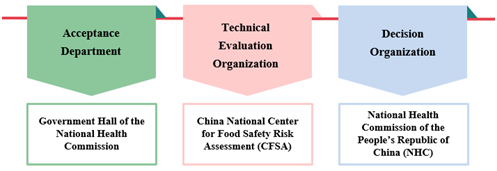In the actual production of food, if a food substance has not been approved in China, it’s necessary to submit related safety assessment materials of this substance to National Health Commission of the People's Republic of China (NHC) for registration. At present, there are two registration types for "food substance", namely, new food raw material (novel food) registration and new food additive registration. In this article, CIRS will discuss the similarities between these two applications.
Definition
|
|
New Food Raw Material |
New Food Additive |
|
Definition |
New food raw material refers to the following substances that have no traditional eating habits in China, including: 1) Animals, plants and microorganisms; 2) Components extracted from animals, plants and microorganisms; 3) Food ingredients that have changed in the original structure; 4) Other newly developed food ingredients. |
Which substance should apply for new food additive? 1) Food additives that have not been listed in GB 2760 Usage of Food Additives and GB 14880 Usage of Nutrition Enhancers; 2) Food additives that have not been listed in subsequent notices issued by NHC; 3) Food additives of which the usage scope or dosage planned to be expanded. |
|
Other requirements |
New food raw materials should have the characteristics of food raw material and conform to the requirements of nutritive. It shall be non-toxic, harmless, and not cause any acute, sub-acute, chronic or other potential hazards to human body. |
Food additives should be technically necessary and proven safety after risk assessment. |
Similarities
1. Same Registration Background
In accordance with Food Safety Law of the People's Republic of China, companies who plan to use new food raw materials to manufacture food products or for the production of a new variety of food additive shall submit the related safety assessment documents to NHC.
2. Same Administrative Department
NHC is responsible for the registration and approval of “three new foods”. (The "three new foods" refers to new food raw materials, new food additives, and new food-related products and articles). The relevant authorities are as follows:

3. Same Registration and Approval Forms
Both of new food raw material registration and new food additive registration are followed by the steps of pre-technical evaluation and post-approval , and there is no limit for the application quantity.
According to their acceptance requirements, the applicant should submit 1 original dossier, 4 copy dossiers, 1 electric CD dossier and 1 sample.
4. Similar Registration Process
The registration processes for new food raw material and new food additive are similarly, which are mainly divided into 5 steps:
Step 1: The applicant submits the dossiers on-line and on-site;
Step 2: The Government Hall checks the integrity of the dossier, and makes a decision on whether to accept the application or not within 5 workdays;
Step 3: Once accepted, CFSA organizes the expert evaluation conference to conduct technical review within 60 days;
Step 4: CFSA releases the draft for public comments;
Step 5: NHC makes the final approval decision, and issues a formal approval announcement.
5. Same Approval Announcement
NHC will publish the approved new food raw materials and new food additives by an "Approval Announcement". Enterprises can produce, sell or use substances in compliance with the announcement contents. On May 29, 2019, totally 24 kinds of new food raw materials, new food additives and new food contact substances were published in one announcement together. Since then, the "Approval Announcement" has been known as "Three New Foods Announcement".
Conclusion
This article introduces the definition of new food raw material and new food additive, and summarizes the five similarities of these two registration types, which shows that the overall supervision modes of them are same in China.

